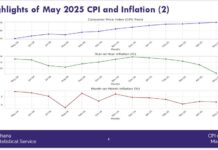By Kwaku OFORI
In Africa, small businesses are the backbone of the economy, driving job creation and economic growth. However, access to financing remains one of the most significant challenges for these businesses. Traditional sources of finance, such as bank loans, often come with prohibitive interest rates and rigid requirements, leaving many small and medium-sized enterprises (SMEs) financially stranded.
Sustainable financing through venture capital (VC) and private equity (PE) funds has emerged as a powerful tool to bridge this gap, offering not only capital but also strategic support and networks to help small businesses grow. Drawing lessons from the US, Europe, and elsewhere, Africa is increasingly exploring these alternative funding models to foster business growth and sustainable development.
The role of venture capital and private equity in sustainable financing
Venture capital and private equity funds offer long-term financial support to businesses with high growth potential, often investing in exchange for equity or ownership stakes. These funds are typically more patient than traditional lenders, focusing on the long-term value creation of the company rather than short-term returns. For small businesses, particularly those in growth sectors such as technology, agriculture, and manufacturing, VC and PE financing can be transformative.
In addition to financial backing, VC and PE investors bring valuable industry knowledge, mentorship, and strategic guidance, helping small businesses to navigate market challenges, scale operations, and refine their business models. This combination of financial and non-financial support can significantly improve the sustainability and success rates of African SMEs.
Lessons from the United States: how venture capital fueled innovation
In the United States, venture capital has played a pivotal role in driving innovation and economic growth. Silicon Valley is perhaps the most well-known example of how VC funding can spur the development of small businesses into global giants. Companies like Apple, Google, and Facebook all started as small ventures but, with the support of venture capital, grew into some of the most successful and innovative businesses in the world.
According to the National Venture Capital Association (NVCA), the total venture capital investment in the US in 2020 was approximately US$156 billion, spread across more than 12,000 deals. This funding supports new businesses, particularly in the technology sector, allowing them to scale rapidly and compete on a global stage.
Case study: Kiva
A notable US-based model that could work well in Africa is Kiva, a nonprofit that provides microloans through crowdfunding. Since its founding in 2005, Kiva has facilitated over US$1.6 billion in loans to 3.2 million borrowers, many of whom are small business owners in developing economies. Although Kiva operates on a smaller scale than traditional VC funds, its impact demonstrates how alternative financing models can empower small businesses to grow sustainably by providing crucial early-stage support.
Private equity’s role in Europe: boosting sustainable businesses
In Europe, private equity has emerged as a key driver of sustainable business development, particularly through the rise of impact investing. The European Private Equity and Venture Capital Association (EVCA) reported that European private equity and venture capital firms raised €82 billion in 2020, with a significant portion directed toward businesses that prioritize environmental, social, and governance (ESG) principles. This focus on sustainability is particularly relevant to African small businesses, many of which operate in sectors like agriculture, renewable energy, and healthcare.
Case study: Actis in Africa
Actis, a UK-based private equity firm, has been particularly active in Africa, investing more than US$3 billion across various sectors, including energy, education, and financial services. One of its standout investments is in the renewable energy sector, where it has supported projects like Lekela Power, which develops wind farms in countries like South Africa, Egypt, and Senegal. Actis’s investments demonstrate how private equity can drive not only business growth but also sustainable development by prioritizing sectors that address critical needs such as energy access and environmental sustainability.
Africa’s venture capital and private equity landscape: the present and the future
While the venture capital and private equity markets in Africa are still relatively young, they are growing rapidly. According to the African Private Equity and Venture Capital Association (AVCA), Africa saw a 63percent increase in private equity deal value between 2019 and 2020, totaling US$3.3 billion. Sectors such as fintech, agriculture, and healthcare have attracted the most investment, given their potential for high returns and social impact.
In Ghana, for instance, the introduction of the Ghana Venture Capital Trust Fund (GVCTF) has provided a model for supporting SMEs through venture capital. The GVCTF, established in 2004, partners with private venture capital funds to co-invest in small businesses, particularly in sectors like agriculture and manufacturing. This partnership model can be expanded across Africa, enabling more small businesses to access sustainable financing.
One of the main challenges for African SMEs seeking venture capital or private equity investment is the perception of high risk associated with doing business in Africa. However, as more success stories emerge, this perception is changing. Companies like Jumia, Africa’s largest e-commerce platform, have shown that with the right mix of technology, strategic support, and capital, African businesses can not only compete locally but also scale globally.
Competing with larger firms: How small businesses can leverage VC and PE support
For small businesses, accessing venture capital or private equity funding can level the playing field when competing with larger, more established firms. By leveraging the strategic insights and networks provided by their investors, SMEs can enhance their operational efficiency, access new markets, and innovate more rapidly than their larger competitors.
Small businesses also have the advantage of being more agile and adaptable than their larger counterparts, allowing them to respond quickly to changing market demands or emerging trends. With the right technological investments and business models, they can serve niche markets that larger firms may overlook or find less profitable.
In the agricultural sector, for example, venture capital-backed startups in Africa are using technology to disrupt traditional value chains. Companies like Twiga Foods in Kenya, which connects farmers directly to retailers through a mobile platform, have significantly reduced post-harvest losses and improved profitability for small-scale farmers. By leveraging technology and capital from VC investors, Twiga Foods has been able to scale quickly, expanding its operations across East Africa and improving the livelihoods of thousands of farmers.
Challenges and opportunities for sustainable financing in Africa
While venture capital and private equity offer significant potential for sustainable financing in Africa, challenges remain. Regulatory hurdles, political instability, and inadequate infrastructure are just a few of the barriers that can make it difficult for investors to operate in certain markets. Additionally, there is often a mismatch between the types of businesses seeking investment and the types of businesses that VC and PE funds typically target. Many African SMEs, particularly those in the informal sector, may not be “investment-ready” in the traditional sense, lacking the financial documentation or governance structures that investors look for.
However, these challenges also present opportunities for innovation. Funds like Savannah Fund and Novastar Ventures have tailored their investment models to better suit the African context, providing smaller investment amounts and more hands-on support to help early-stage businesses grow. By adapting their approaches to the unique needs of African SMEs, these funds are creating a new path for sustainable financing on the continent.
Conclusion: the way forward for Africa’s small businesses
As African small businesses continue to face challenges accessing traditional finance, venture capital and private equity offer a viable alternative that can support long-term growth and sustainability. By drawing lessons from the success stories in the US, Europe, and even within Africa itself, these businesses can leverage VC and PE support to innovate, expand, and compete on a global scale.
For over 15 years, I have worked closely with small businesses across Africa, helping them secure the financing and strategic support needed to grow. The future of African entrepreneurship is bright, and with the right mix of sustainable financing, innovation, and strategic partnerships, Africa’s small businesses have the potential to transform not only their local economies but the global business landscape as well.
>>>The writer is Kwaku Ofori, an expert in Small Business Management and Microcredit, a Chartered Accountant, and a STEM MBA Fellow at Babson College, Massachusetts. He can be reached via [email protected]
References
- African Private Equity and Venture Capital Association (AVCA). (2021). African Private Equity Industry Report.
Provides insights into the private equity landscape in Africa, with data on deal values, sectors, and trends. - National Venture Capital Association (NVCA). (2020). Venture Monitor: The State of the Venture Capital Industry in the US.
A comprehensive report on venture capital in the US, covering investment trends and key sectors. - OECD (2020). Private Equity in Europe: Promoting Sustainable Businesses.
An OECD report discussing the role of private equity in driving sustainable business growth in Europe, with lessons for other regions. - KPMG Africa. (2021). Venture Capital in Africa: Growth, Challenges, and Opportunities.
An analysis of the venture capital market in Africa, highlighting key opportunities and barriers to investment. - World Bank. (2017). Financing SMEs and Entrepreneurs 2017: An OECD Scoreboard.
A report that explores different financing options for SMEs globally, with insights into VC and PE financing. - Savannah Fund (2021). Annual Report.
Details the activities of Savannah Fund, a leading venture capital fund investing in early-stage African startups.










